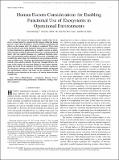Human Factors Considerations for Enabling Functional Use of Exosystems in Operational Environments
Author(s)
Stirling, Leia A.; Siu, Ho Chit; Jones, Eric; Duda, Kevin
DownloadAccepted version (1.288Mb)
Terms of use
Metadata
Show full item recordAbstract
The domain of human factors considers how to improve system design by considering the human within the design process, rather than designing a system and then considering the effects on the human after the design is completed. There have been decades of work in the domain of human factors and human-system integration in applications for complex systems to understand concepts within the physical domain (e.g., system sizing and injury risk) and cognitive domain (e.g., workload, situation awareness, and automation mode confusion). Exosystem technologies are reaching the point where the transition to an operational environment is within reach. This paper presents human factors principles related to the cognitive domain. We present examples of these concepts in the context of exosystem design for operational environments and to aid the development of system evaluation standards. We also review current exosystem evaluation methods and present how performance metrics and tasks can be expanded to better describe system function in the context of known human factors complexities.
Date issued
2019-03Department
Massachusetts Institute of Technology. Department of Aeronautics and AstronauticsJournal
IEEE Systems Journal
Publisher
Institute of Electrical and Electronics Engineers (IEEE)
Citation
Stirling, L. et al. "Human Factors Considerations for Enabling Functional Use of Exosystems in Operational Environments." IEEE Systems Journal 13, 1 (March 2019): 1072-1083 © 2018 IEEE
Version: Author's final manuscript
ISSN
1932-8184
1937-9234
2373-7816
Keywords
Control and Systems Engineering, Electrical and Electronic Engineering